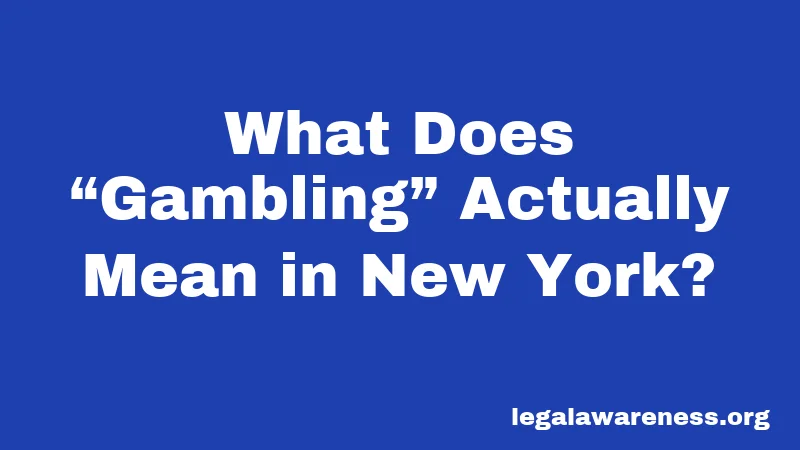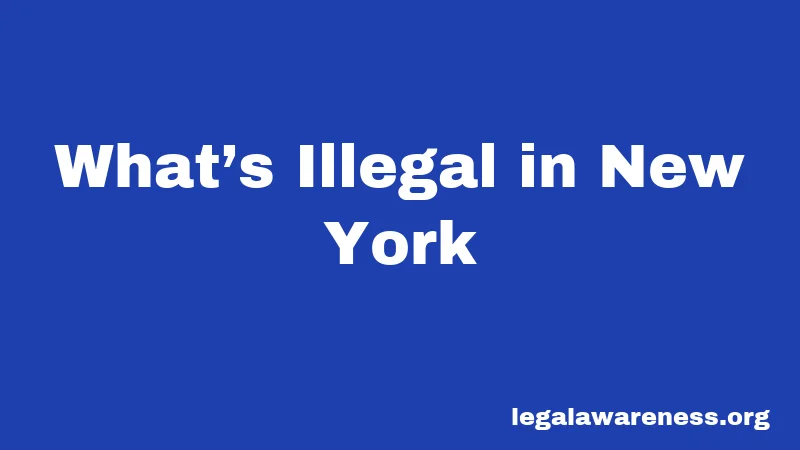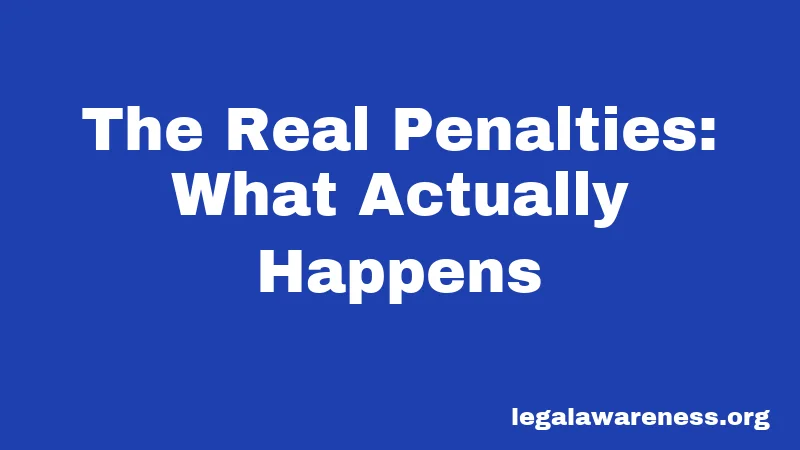New York Gambling Laws in 2026: What’s Legal and What’s Not
You’ve probably wondered what gambling is actually allowed in New York. Maybe you saw ads for sweepstakes casinos or planned a trip to Atlantic City. The thing is, New York has some pretty specific gambling rules. Some activities are totally legal. Others? Not so much. Let’s break down exactly what you can and can’t do.
Most people think gambling is just… gambling. But in New York, the law gets really detailed about what counts. The state’s approach is pretty strict. You can bet on some things. Other things will get you arrested. Yeah, it’s that serious.
What Does “Gambling” Actually Mean in New York?

Here’s where things get interesting. In New York, gambling has a specific legal definition. You’re gambling when you risk something of value. That something depends on a game of chance. And you expect to get money or something valuable in return if you win.
Sound complicated? It’s actually not. Think of it like this: You put $20 on a game. The outcome depends on luck, not skill. You could win money. That’s gambling under New York law. Simple, right?
The key word here is “chance.” If the outcome depends mainly on luck, New York considers it gambling. Even if a little skill is involved, it probably still counts.
What’s Legal to Do in New York
Okay, pause. This part’s important. New York does allow some gambling. You’re not completely blocked from betting on things. Here’s what’s actually legal.
Sports Betting Online
Good news if you like to bet on sports. You can legally place bets on the NFL, NBA, MLB, hockey, and other sports using your phone. New York legalized online sports betting in 2021. It officially launched in 2022. If you’re 21 or older, you can use apps like FanDuel, DraftKings, and others.
Here’s the catch: All the money has to go through one of New York’s licensed casinos. The betting apps work with specific casino partners. But as a bettor, you don’t really notice that part. You just download the app and place your bets legally.
You’re not alone if this confuses you. Most people don’t realize online sports betting became legal until they saw the ads everywhere. But trust me, it’s totally legal now in New York.
Horse Racing and Betting
You can bet on horse races. New York has a long history with horse racing. The famous Saratoga Race Course has been around since 1863. You can place bets at the racetrack or online on horse races.
State Lottery
New York’s lottery is totally legal. You buy tickets for Powerball, Mega Millions, Pick 3, Pick 4, and other state games. The money from ticket sales goes to education. This one’s been around for decades.
Casino Gambling at Licensed Casinos
New York has four licensed commercial casinos you can visit. Resorts World Catskills and Rivers Casino are operating. Mohegan Inspire and Empire Resorts are in development. You can gamble at these locations legally if you’re 21 or older.
Video lottery gaming at racetracks is also permitted. These are regulated and inspected by the state.
Friendly Games of Chance
Here’s a fun one. You can play poker with friends. You can play card games or dice games at home. There’s a special rule: You can have a “social game of chance” among friends. Nobody profits from the game except through their own winnings. Everyone plays on equal terms. No house edge. No one running the game and taking a cut.
This applies to casual games. Home poker nights? Legal. Backyard card games with neighbors? Legal. But if someone’s organizing it as a business, that changes everything.
What’s Illegal in New York

Now for the serious stuff. These gambling activities will get you arrested or fined. And the penalties can be harsh.
Illegal Gambling Operations
Operating an underground casino is a felony. So is running an illegal poker game or bookmaking operation. Bookmaking means taking bets as a business. Even if you’re just accepting bets for money in your apartment, you could face charges.
Wait, it gets better. If you’re running an illegal operation with at least five people, and you’ve taken in more than $2,000 in a day or operated for 30 days straight, you could face federal charges. Federal penalties are way harsher than state penalties.
Possession of Gambling Devices
You cannot own slot machines. You cannot have video poker machines that pay money. You can’t have other gambling equipment without a license.
Possession of one gambling device is a Class A misdemeanor. That means up to one year in jail. You could also face fines. If you have multiple devices, prosecutors will assume you knew they were illegal.
Online Sweepstakes Casinos
This one’s brand new and important. New York recently banned sweepstakes casinos. These were websites that let you play slot games using “virtual coins.” You could buy these coins and exchange winnings for real money or gift cards.
Sounds harmless? The state shut all 26 of them down in 2025. Here’s why: These sites have zero oversight. Games could be rigged. Your money isn’t protected. You have no way to know if the site will actually pay you.
Honestly, this is the part most people miss. These sweepstakes casinos looked legal. They weren’t. If you operate one, you could face fines between $10,000 and $100,000 for each violation. You could also lose your gaming license forever.
Promoting Gambling
This is a criminal offense. “Promoting gambling” means knowingly advancing or profiting from illegal gambling.
There are two levels. Promoting gambling in the second degree is a Class A misdemeanor. You could get up to one year in jail and three years probation. This applies when you advance or profit from unlawful gambling.
Promoting gambling in the first degree is more serious. It’s a Class E felony. You can face one to four years in prison and five years probation. This applies when you’re involved with larger operations or greater money amounts.
Possession of Gambling Records
You can’t keep records of illegal gambling. You can’t possess betting slips, account books, or paperwork from illegal operations. This is a Class A misdemeanor, punishable by up to one year in jail.
The law considers this serious because gambling records are used to run organized operations.
Recent Changes and What’s Coming in 2026
Things are moving fast in New York gambling law. You need to know what just changed and what’s coming.
The Sweepstakes Ban
In 2025, New York Attorney General Letitia James shut down 26 online sweepstakes casinos. All of them. The AG’s office sent cease-and-desist letters. Every single platform stopped operating.
This happened because these casinos offered no protection to players. They weren’t audited. Games weren’t verified fair. They were basically unregulated gambling.
Online Casino Push (Still Not Legal)
Here’s something interesting. State Senator Joseph Addabbo has pushed hard to legalize online casinos. In January 2025, he introduced bill S2614 to allow online interactive gaming.
Wondering if this will pass? Not in 2025. But the momentum is building. The proposal has stronger backing than before. If it passes in 2026, online casinos could launch within a year or two after that. But that’s still a “maybe” situation.
For now? Online casinos are not legal in New York. Period. Don’t use them, even if sites claim they’re legal.
The 21-Plus Age Requirement
A new bill is working through the legislature. It would raise the minimum gambling age from 18 to 21 for all forms of gambling. This already applies to sports betting. The bill would extend it to video lottery gaming at racetracks.
The reasoning is solid. Studies show that young people who gamble have higher rates of addiction. By requiring people to be 21, the state hopes to reduce problem gambling in teens.
Sportsbook Fairness Proposed
New York might be passing what’s called the “Fair Play Act.” This would prevent sportsbooks from limiting winning bettors. Right now, some books cap deposits or ban players who win too much.
The proposed rule says sportsbooks must treat all players equally. They can still monitor for fraud or problem gambling. But they can’t just shut out someone because they’re winning.
This bill is still being discussed. It’s not law yet. But it shows the state is thinking about player protections.
The Real Penalties: What Actually Happens

Let me be straight with you. Gambling charges in New York are serious. Here’s what could happen to you.
Misdemeanor Penalties
For Class A misdemeanors (promoting gambling, possession of gambling devices): Up to one year in jail. Fines that courts decide at sentencing. Three years of probation. A criminal record that follows you forever.
Felony Penalties
For Class E felonies (first-degree promoting gambling): One to four years in state prison. Five years of probation. Substantial fines. Asset forfeiture (the government takes your money and property).
Federal Charges
If you’re operating with others, federal charges are likely. Federal gambling charges can include: Up to 10 years in prison. Massive fines. Forfeiture of all money and property related to the operation.
Extra Consequences
Here’s what most people don’t think about. A gambling conviction affects more than just jail time:
Your criminal record will hurt job prospects. Many employers refuse to hire people with gambling convictions. You might lose professional licenses. You can’t work in certain industries. Student loans, housing, and credit could all be affected. Banks will be suspicious of your accounts.
Pretty serious, right? Yeah, it actually is.
Who’s Enforcing These Laws
The New York State Gaming Commission oversees legal gambling. But local police, state police, and federal investigators all work gambling cases.
The Attorney General’s office actively prosecutes gambling crimes. They’ve been especially focused on sweepstakes casinos and illegal operations. Recent enforcement efforts show they’re taking this seriously.
You’re not going to slip through unnoticed. These agencies have investigation tools, surveillance, undercover operations, and the power to seize assets.
Questions People Actually Ask
Can I play poker with friends for money?
Yes, if it’s casual and social. Everyone plays on equal terms. No one’s making money from running the game. But if someone’s taking a cut or it becomes a regular business operation, that changes things. The key is: Is this a real friendship game or a gambling business?
What about fantasy sports leagues?
Daily fantasy sports are legal in New York. You can play DraftKings, FanDuel fantasy contests, and similar platforms. These are considered games of skill. They’re regulated differently than gambling. You have to be 18 or older.
Is online gambling from other states legal for me in New York?
No. If a site isn’t licensed in New York, it’s illegal for you to use it, even if it’s legal somewhere else. Offshore casinos? Illegal. Other states’ online casinos? Illegal if you’re in New York. The state will prosecute people who use unlicensed platforms.
Can I bet on crypto or prediction markets?
Crypto betting and prediction markets exist in gray areas. They’re not explicitly illegal. But they’re also not regulated by the state. You use them at your own risk. The state’s stance could change at any time.
What should I do if I have a gambling problem?
New York offers free, confidential help. Call the HOPEline at 1-877-8-HOPENY (1-877-846-7369). You can also text HOPENY to 467369. These are available 24/7. The state’s Office of Addiction Services and Support connects people with resources and treatment.
Do I have to report gambling winnings on taxes?
Yes. If you win significant money from legal gambling, you need to report it to the IRS and New York State. Casinos will send you a W-2 or 1099. Keep records of your wins and losses. This is required by law, even if you don’t receive a form. Federal law changed in 2026 with the “One Big Beautiful Bill Act.” Now you can only deduct 90% of your losses from your winnings. This creates something called “phantom income,” where you might owe taxes even if you broke even overall. Talk to a tax professional about this.
Can I be arrested just for being at an illegal gambling location?
Depends. If you’re just playing, you’re probably not the target. Law enforcement usually targets operators and promoters. That said, you can be charged with participating in illegal gambling. If you’re gambling at a location that’s part of an organized operation, you could be prosecuted. Your best move? Stay away from anything that looks illegal.
Final Thoughts
New York’s gambling laws are pretty clear once you understand them. Sports betting is legal and huge. Casinos are legal and licensed. The state lottery is legal. But illegal operations? Sweepstakes casinos? Operating gambling businesses? Those will land you in serious trouble.
The state is serious about enforcement. They’re closing illegal operations. They’re prosecuting offenders. They’re also thinking about the future. Online casinos might come eventually. Protections for players are being discussed. The system is evolving.
Your job is simple: Stick to legal gambling. Use licensed sportsbooks. Visit licensed casinos. Play the state lottery. Enjoy friendly poker games with friends. Stay away from anything unlicensed. The penalties for breaking these rules are real, and they’re harsh.
If you’re struggling with gambling, help is available. If you have specific questions about whether something is legal, talk to a lawyer. When in doubt, don’t do it. Now you know the basics. Stay informed, stay safe, and enjoy legal gambling responsibly.
References
New York State Gaming Commission – Official Homepage
New York State Penal Law Article 225 – Gambling Offenses
New York Attorney General’s Office – Sweepstakes Casino Enforcement
New York State Senate Bill S2614 – Interactive Gaming Proposal
New York State Problem Gambling Resources – HOPEline
New York Racing and Wagering Law – Tax Law Provisions
New Jersey Casino Control Commission – For Reference on Neighboring State
